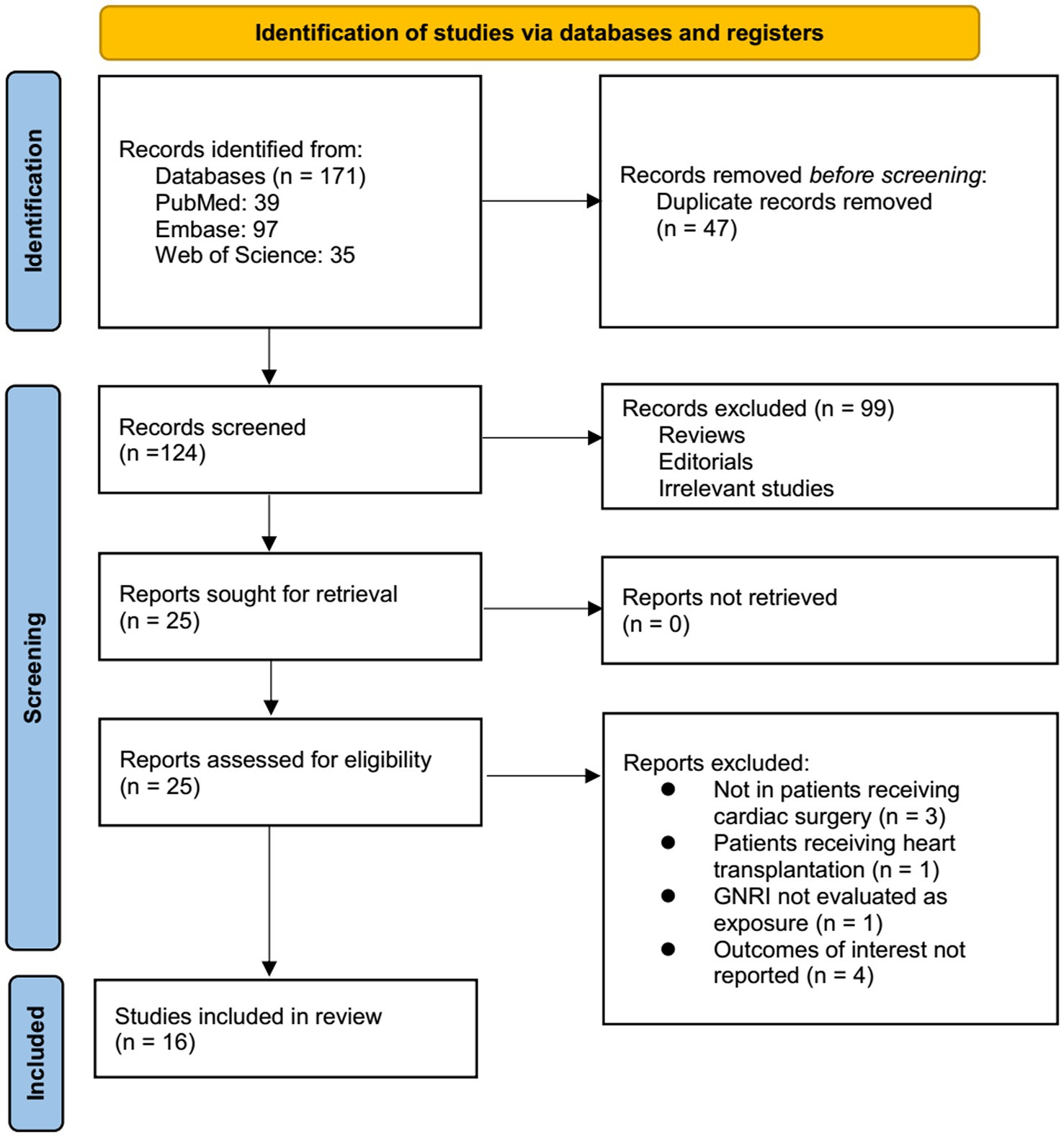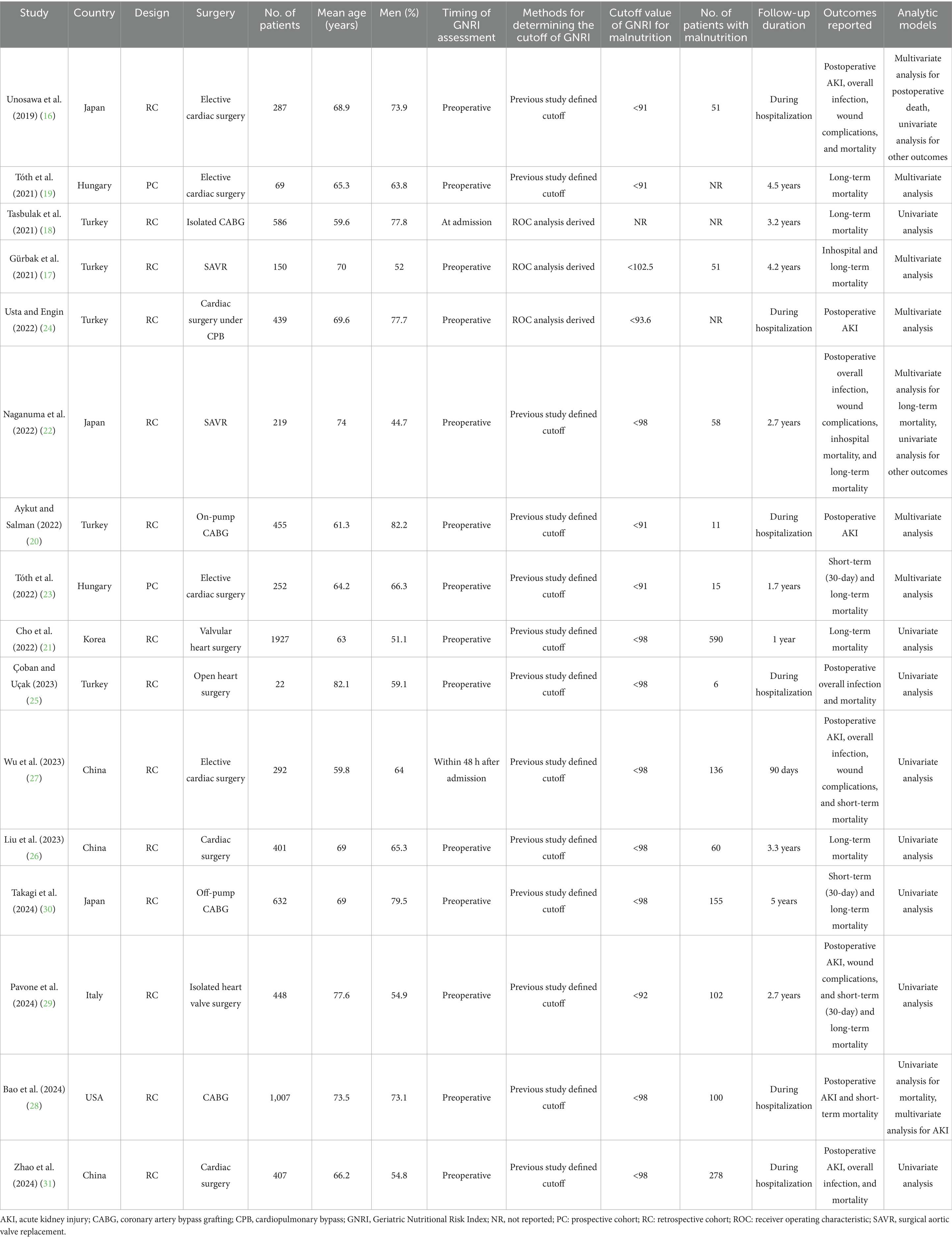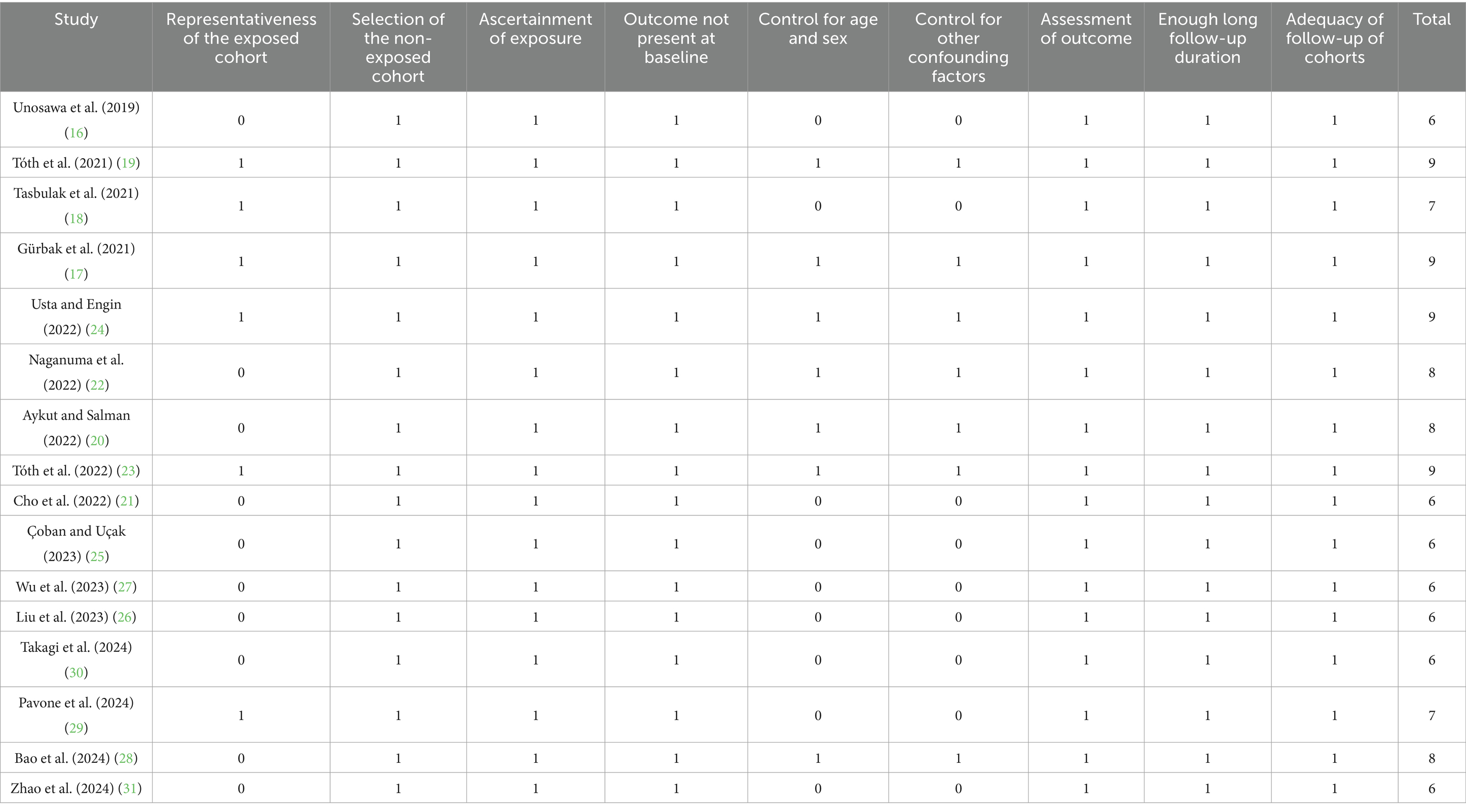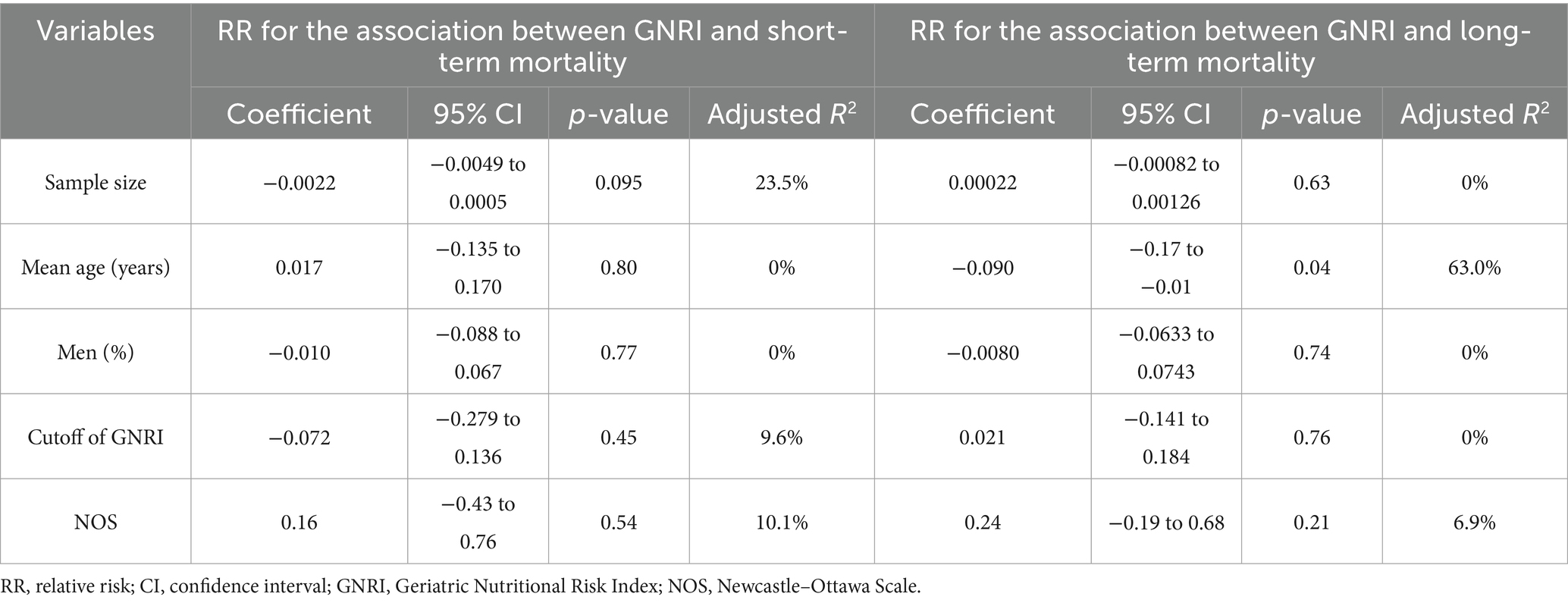- Wuhan Asia Heart Hospital, Wuhan, China
Background: The Geriatric Nutritional Risk Index (GNRI) is a key indicator of nutritional status in elderly individuals. Poor nutritional status has been linked to unfavorable surgical outcomes, but its prognostic value in cardiac procedures remains uncertain. This meta-analysis investigates the relationship between the GNRI and prognosis in cardiac surgery patients.
Methods: A comprehensive literature search was performed across the PubMed, Embase, and Web of Science databases. Studies were included if they evaluated preoperative GNRI and reported short-term mortality, long-term mortality, or major postoperative complications, such as acute kidney injury (AKI), wound complications, and infections. Risk ratios (RRs) and 95% confidence intervals (CIs) were calculated to compare outcomes between patients with low and normal GNRI. Heterogeneity was assessed using the I2 statistic, and a random-effects model was used to synthesize and analyze the results from the included studies.
Results: The pooled results of 16 cohort studies involving 7,593 patients showed that a low preoperative GNRI was significantly associated with an increased risk of short-term mortality (RR: 3.19, 95% CI: 1.68–6.07, p < 0.001; I2 = 39%) and long-term mortality (RR: 2.32, 95% CI: 1.63–3.30, p < 0.001; I2 = 77%). Low GNRI was correlated with a higher risk of AKI (RR: 1.77, 95% CI: 1.11–2.81, p = 0.02; I2 = 74%) and overall infection (RR: 3.35, 95% CI: 2.01–5.57, p < 0.001; I2 = 29%), while no significant association was observed for wound complications, although this outcome was based on only four studies. Meta-regression identified mean age as a significant contributor to heterogeneity in long-term mortality (p = 0.04), while sample size explained part of the heterogeneity in short-term mortality (adjusted R2 = 23.5%).
Conclusion: A low preoperative GNRI is correlated with an increased risk of mortality and postoperative complications in cardiac surgery patients. Preoperative nutritional assessment using GNRI may identify high-risk patients.
Systematic review registration: PROSPERO ID CRD42025637322.
Introduction
With the growing prevalence of cardiovascular diseases, like coronary artery and valvular heart disease, cardiac surgery is becoming more common globally, especially among aging populations (1, 2). Although advancements in surgical techniques and perioperative care have enhanced survival rates, cardiac surgery still carries substantial risks (3). Postoperative complications, including acute kidney injury (AKI), infections, and wound complications, as well as short- and long-term mortality, pose substantial challenges to improving patient outcomes (4, 5). These adverse events not only increase morbidity and healthcare costs but also negatively impact the functional recovery and long-term quality of life of the patients (6). Identifying novel, reliable predictors of adverse postoperative outcomes is essential for risk stratification and the optimization of perioperative management (6).
Malnutrition has emerged as a critical determinant of postoperative outcomes in cardiac surgery (7). Poor nutritional status has been associated with compromised immune function, delayed wound healing, muscle wasting, and increased susceptibility to infections, all of which can contribute to poor recovery and increased mortality (8, 9). Malnutrition is particularly prevalent in older patients undergoing cardiac surgery due to age-related physiological changes, chronic diseases, and reduced dietary intake (10).
To assess the nutritional status of patients, various biomarkers and scoring systems have been established, with the Geriatric Nutritional Risk Index (GNRI) gaining recognition as a practical and prognostic tool (8). The GNRI is a straightforward and objective index calculated from serum albumin levels and body weight in relation to ideal weight (11). It was initially developed to assess nutritional risk in elderly patients and has since been applied to various clinical settings, including cardiac surgery (12). Compared to other nutritional assessment tools, the GNRI offers several advantages: it is easy to calculate, does not require complex measurements such as muscle mass evaluation, and has been validated as a predictor of adverse outcomes in hospitalized patients (13, 14). Importantly, the GNRI can be readily incorporated into routine preoperative assessments, allowing for the early identification of high-risk patients and the implementation of targeted nutritional interventions (15).
Recent studies have investigated the association between the GNRI and postoperative outcomes after cardiac surgery. However, the results of these studies are not always consistent, leading to uncertainty regarding the clinical utility of the GNRI in this context (16–31). Variations in study designs, sample sizes, GNRI cutoff values, and outcome definitions may have contributed to these discrepancies. Given the potential impact of malnutrition on surgical outcomes and the need for reliable prognostic tools, a comprehensive synthesis and analysis of the available evidence is warranted. Accordingly, this meta-analysis was conducted to examine the relationship between the GNRI and postoperative outcomes in patients undergoing cardiac surgery.
Methods
This meta-analysis followed the Preferred Reporting Items for Systematic Reviews and Meta-Analyses (PRISMA) 2020 guidelines (32, 33) and the Cochrane Handbook for Systematic Reviews and Meta-Analyses (34) for protocol design, data extraction, statistical analysis, and results reporting. The study protocol was also registered in the International Prospective Register of Systematic Reviews database, also known as PROSPERO, under ID CRD42025637322.
Literature search
Relevant studies for this meta-analysis were identified through a comprehensive search across the PubMed, Embase, and Web of Science databases using a broad range of search terms, including: (“geriatric nutritional risk index” OR “GNRI”) AND (“cardiac surgery” OR “heart surgery” OR “coronary artery bypass” OR “CABG” OR “cardiopulmonary bypass” OR “valve surgery” OR “tricuspid valve replacement” OR “mitral valve replacement” OR “aortic valve replacement” OR “cardiopulmonary bypass”). The search was limited to human studies and full-length articles published in English in peer-reviewed journals. Additionally, references from relevant original and review articles were manually screened for identifying further eligible studies. The search spanned from database inception to December 9, 2024.
Inclusion and exclusion criteria
The eligibility criteria for studies were established based on the PICOS framework:
P (patients): Adult patients undergoing cardiac surgery, such as coronary artery bypass grafting (CABG) and valvular surgeries.
I (exposure): Patients identified as malnourished as indicated by a low GNRI at baseline, with cutoff values consistent with those used in the original studies.
C (comparison): Patients with a normal GNRI at baseline.
O (outcome): Incidence of short-term mortality, defined as all-cause deaths occurring during hospitalization or within 3 months; the incidence of postoperative complications, such as AKI, wound-related complications, and overall infection, as defined by the criteria of the included studies; and long-term mortality, defined as all-cause deaths with a follow-up duration of at least 1 year.
S (study design): Longitudinal observational studies, including cohort studies, nested case–control studies, and post-hoc analyses of clinical trials.
Studies were excluded if they were reviews, editorials, meta-analyses, or preclinical research, or if they did not focus specifically on patients undergoing cardiac surgery, were lacking in GNRI exposure assessment, or did not report any of the outcomes of interest. Studies involving patients undergoing cardiac transplantation were also excluded, as this patient population has a distinct disease course and prognosis compared to those undergoing conventional cardiac surgeries, such as CABG or valvular procedures. In cases of population overlap, the study with the largest sample size was selected for inclusion in the meta-analysis.
Study quality assessment and data extraction
Two authors independently conducted the literature search, study selection, quality assessment, and data extraction, resolving discrepancies through discussion with the corresponding author. Study quality was evaluated using the Newcastle–Ottawa Scale (NOS) (35), which assesses selection, confounding control, and outcome measurement, with scores ranging from 1 to 9, where 9 represents the highest quality studies. Studies with NOS scores of 7 or above are considered of high quality. The data extracted for analysis included the following study characteristics: author, year, country, and design; type of surgery, participant details (number of included patients, mean age, and sex); timing of GNRI assessment; methods used to determine the cutoff for the GNRI; the cutoff value of the GNRI indicative of malnutrition; the number of patients classified as malnourished based on a low GNRI; follow-up durations; reported outcomes; and the analytical model used (univariate or multivariate) to estimate the relationship between the GNRI and outcomes following cardiac surgery.
Statistical analyses
The primary outcome of this study was to determine the association between the GNRI and short-term (within 90 days) and long-term (beyond 1 year) mortality in patients after cardiac surgery. The secondary outcome was to evaluate the association between the GNRI and the incidence of AKI, wound complications, and overall infection during hospitalization. The results were expressed as risk ratios (RRs) with 95% confidence intervals (CIs), comparing the outcome incidence between the patients with a low GNRI and those with a normal GNRI. RRs and their standard errors were calculated from 95% CIs or p-values and log-transformed to stabilize variance and normalize distribution (34). To assess heterogeneity, we used the Cochrane Q test and I2 statistics (36), with I2 < 25, 25–75%, and >70% indicating mild, moderate, and substantial heterogeneity among the included studies, respectively. A random-effects model was used to synthesize and analyze the results while accounting for variability across studies (34). Sensitivity analysis was conducted by sequentially excluding individual studies to assess the robustness of the findings. For the primary outcome, subgroup analyses were performed to explore the effects of various factors on the results, such as type of surgery (CABG, valvular surgery, or overall type of cardiac surgery), cutoffs of the GNRI, follow-up durations, analytic models, and NOS scores. Subgroups were defined using the median values of continuous variables as cutoff points. Publication bias was assessed through funnel plots, visual asymmetry inspection, and Egger’s regression test (37). In addition, univariate meta-regression analyses were performed to evaluate if the association between the GNRI and short-term or long-term mortality risk of patients after cardiac surgery could be significantly affected by continuous variables in the included studies, such as sample size, mean age, proportion of men, cutoff values of the GNRI, or NOS scores (34). A p-value < 0.05 indicated statistical significance. The statistical analyses were conducted using RevMan (version 5.1; Cochrane Collaboration, Oxford, UK) and Stata software (version 12.0; Stata Corporation, College Station, TX, USA).
Results
Study identification
Figure 1 outlines the study selection process. Initially, 171 records were identified across the three databases, with 47 duplicates removed. After title and abstract screening, 99 articles were further excluded for not meeting the meta-analysis criteria. The full texts of the remaining 25 studies were independently reviewed by two authors, leading to the further exclusion of 9 for the reasons detailed in Figure 1. Ultimately, 16 studies were included in the quantitative analysis (16–31).
Overview of the study characteristics
Table 1 presents a summary of the characteristics of the studies included in the meta-analysis. Overall, one prospective cohort study (19) and 15 retrospective cohort studies (16–18, 20–31) were included in the meta-analysis. These studies were published from 2019 to 2024, and were conducted in Japan, Hungary, Turkey, Korea, China, Italy, and the United States. A total of 7,593 patients undergoing cardiac surgeries, such as CABG and/or valvular surgeries, were included. The mean ages of the patients were 59.6 to 82.1 years old, and the proportions of men were 44.7–82.2%. All the patients were assessed for GNRI before cardiac surgery. The cutoff values for a low GNRI were based on previously defined cutoffs in 13 studies (16, 19–23, 25–31), as well as the receiver operating characteristic curve analysis-derived cutoffs in three studies (17, 18, 24). The cutoff values for defining a low GNRI varied from 91.0 to 102.5. Follow-up periods ranged from in the hospitalization period to 4.5 years after. The outcome of short-term mortality was reported in 10 studies (16, 17, 22, 23, 25, 27–31). The incidences of postoperative AKI, wound complications, and overall infection were reported in seven (16, 20, 24, 27–29, 31), four (16, 22, 27, 29), and five studies (16, 22, 25, 27, 31), respectively. The outcome of long-term mortality was reported in nine studies (17–19, 21–23, 26, 29, 30). NOS scores ranged from six to nine, indicating moderate to high methodological and reporting quality (Table 2).
GNRI and short-term mortality after cardiac surgery
Overall, ten studies (16, 17, 22, 23, 25, 27–31) reported the association between a low preoperative GNRI and the risk of short-term mortality after cardiac surgery. The pooled results indicated that a low GNRI, reflecting malnutrition, was linked to a higher risk of postoperative mortality within 90 days of cardiac surgery (RR: 3.19, 95% CI: 1.68–6.07, p < 0.001; I2 = 39%; Figure 2A). Sensitivity analysis, excluding one study at a time, showed no significant impact on the results (RR: 2.72–4.40, p all < 0.05). Subsequent subgroup analyses suggested that the association between a low GNRI and short-term mortality after cardiac surgery was not significantly modified by the type of cardiac surgery (p for subgroup difference = 0.39; Figure 2B), cutoffs of the GNRI (p for subgroup difference = 0.34; Figure 2C), follow-up durations (p for subgroup difference = 0.50; Figure 3A), analytic models (p for subgroup difference = 0.36; Figure 3B), or study quality scores (p for subgroup difference = 0.67; Figure 3C). Consistently, univariate meta-regression analysis also did not suggest that sample size, mean age, proportion of men, cutoff values of the GNRI, or NOS scores of the included studies significantly affected the association between the GNRI and short-term mortality of patients after cardiac surgery (p all >0.05; Table 3). However, among these factors, differences in the sample size may explain the majority of the heterogeneity, with an adjusted R2 = 23.5% (p = 0.095).
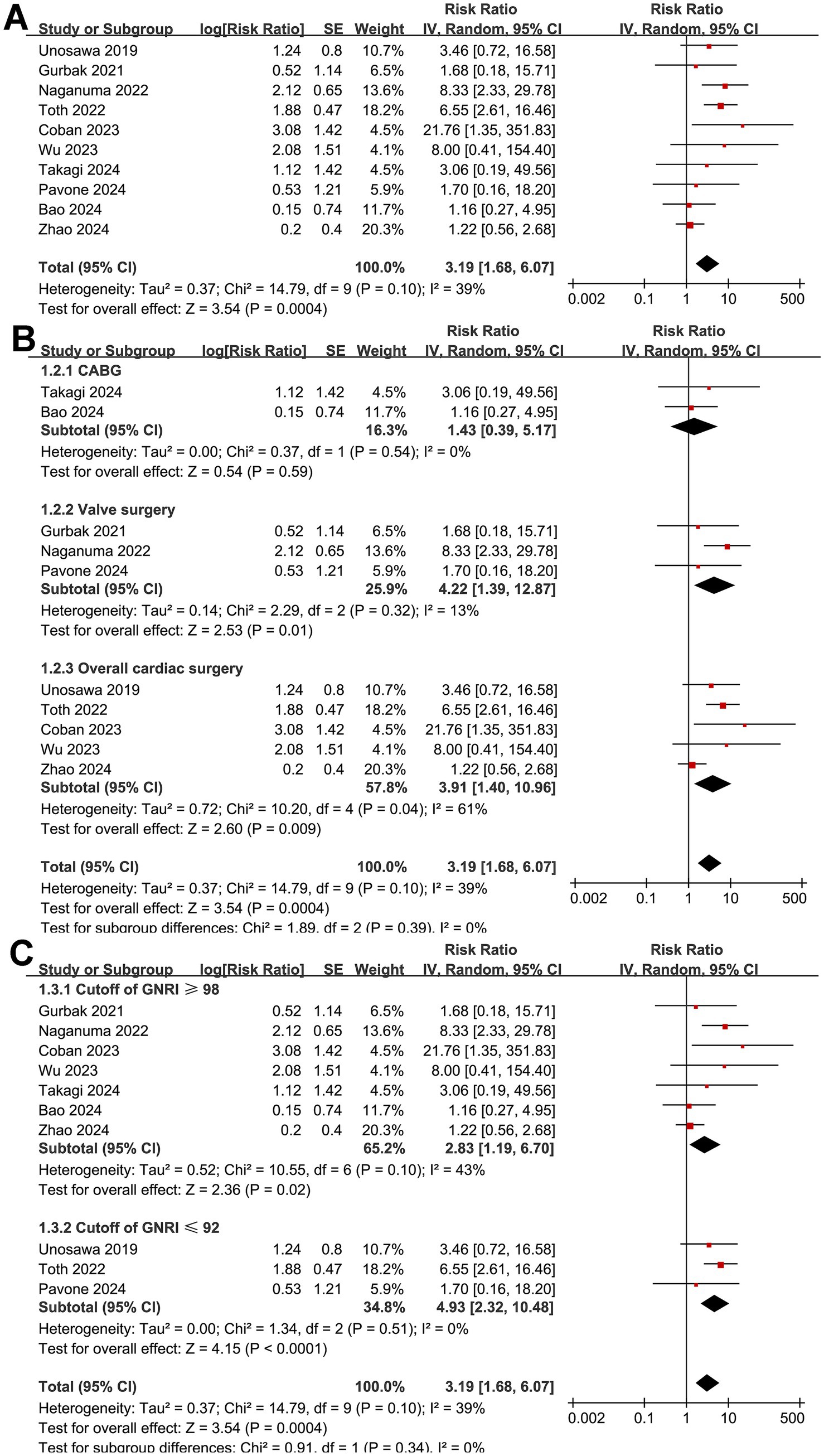
Figure 2. Forest plots for the meta-analysis of the association between a low GNRI and the risk of short-term mortality in patients after cardiac surgery. (A) Overall meta-analysis; (B) subgroup analysis according to the surgery type; (C) subgroup analysis according to the cutoffs of the GNRI. GNRI, Geriatric Nutritional Risk Index.
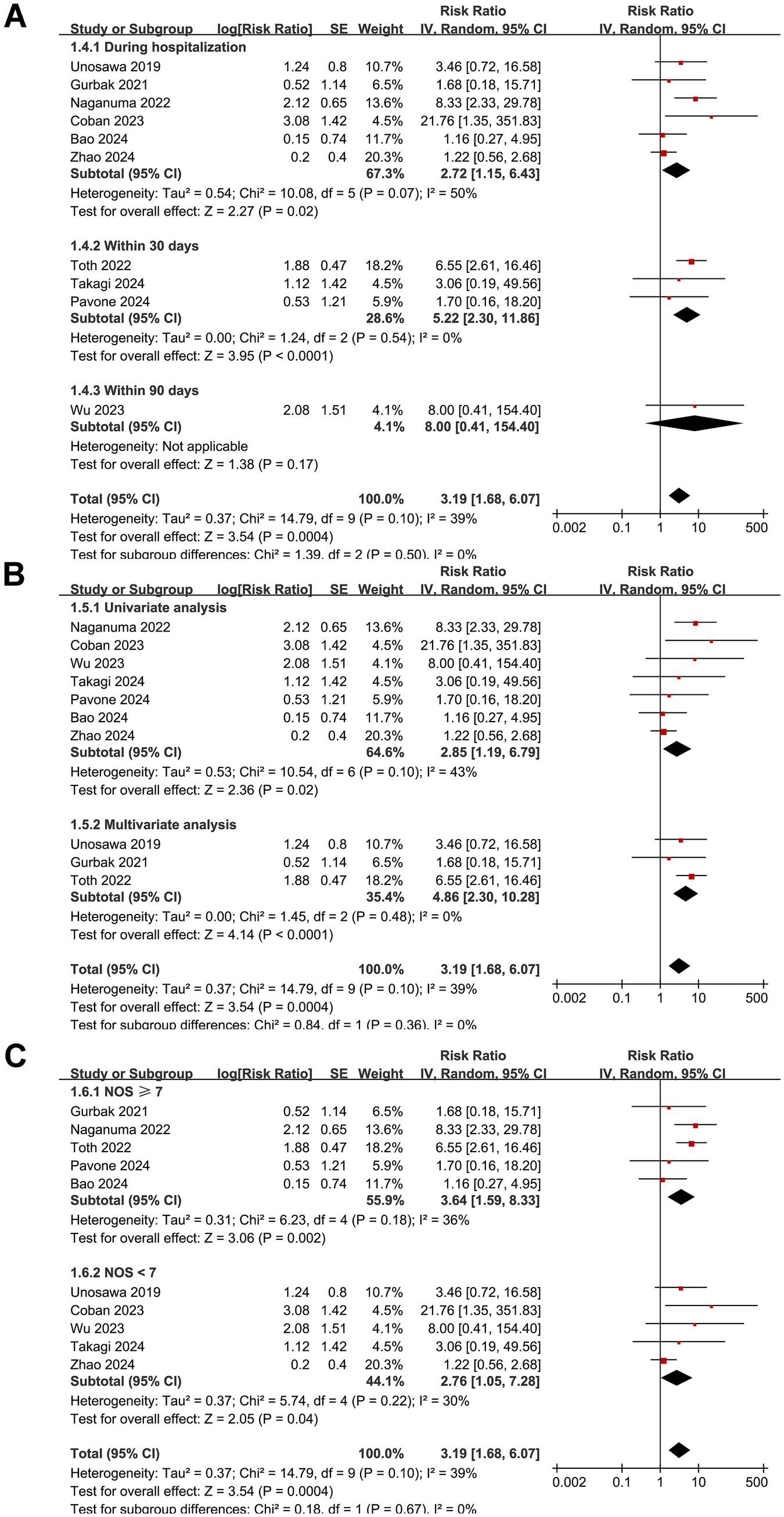
Figure 3. Forest plots for the subgroup analyses of the association between a low GNRI and the risk of short-term mortality in patients after cardiac surgery. (A) Subgroup analysis according to the follow-up durations; (B) subgroup analysis according to the analytic models; (C) subgroup analysis according to the NOS scores. NOS, Newcastle–Ottawa Scale.
GNRI and postoperative complications
Meta-analysis with seven studies (16, 20, 24, 27–29, 31) suggested that a low GNRI before surgery was associated with a higher risk of AKI after cardiac surgery (RR: 1.77, 95% CI: 1.11–2.81, p = 0.02; I2 = 74%; Figure 4A), while the pooled results of four studies (16, 22, 27, 29) did not show a significant association between a low GNRI and an increased incidence of wound complications (RR: 2.43, 95% CI: 0.87–6.80, p = 0.09; I2 = 0%; Figure 4B). Further meta-analysis with five studies (16, 22, 25, 27, 31) suggested that malnutrition as indicated by a low GNRI was associated with an increased risk of overall infection after cardiac surgery (RR: 3.35, 95% CI: 2.01–5.57, p < 0.001; I2 = 29%; Figure 4C).
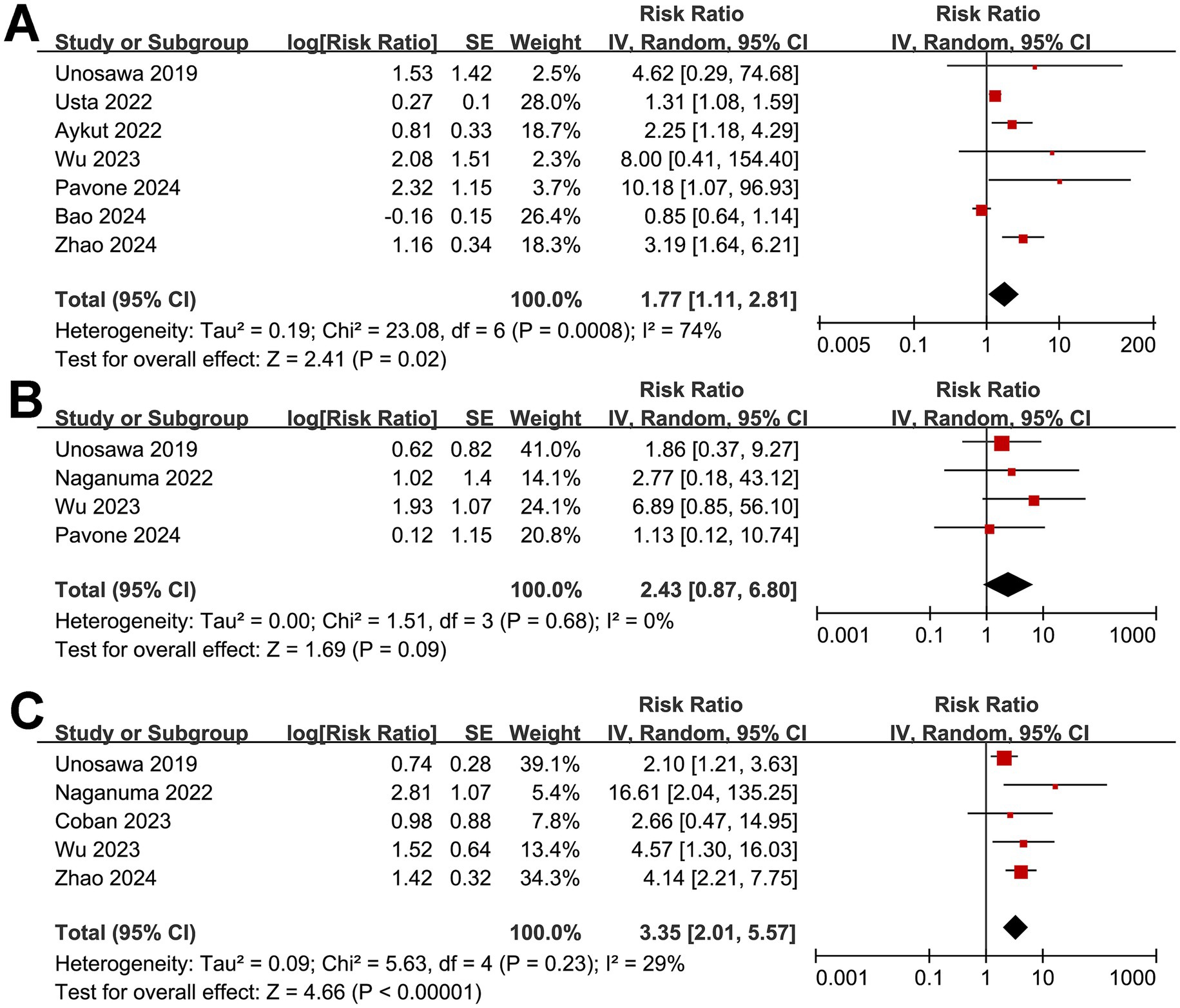
Figure 4. Forest plots for the meta-analysis of the association between a low GNRI and the risk of postoperative complications. (A) Forest plots for the outcome of postoperative AKI; (B) forest plots for the outcome of overall wound complications; (C) forest plots for the outcome of overall infection after cardiac surgery. AKI, acute kidney injury; GNRI, Geriatric Nutritional Risk Index.
GNRI and long-term mortality after cardiac surgery
The pooled results of nine studies (17–19, 21–23, 26, 29, 30) showed that a low GNRI before surgery was associated with an increased risk of long-term mortality in patients after cardiac surgery (RR: 2.32, 95% CI: 1.63–3.30, p < 0.001; I2 = 77%; Figure 5A). Omitting individual studies in the sensitivity analysis did not significantly alter the results (RR: 2.03–2.55, p all < 0.05). Further subgroup analyses according to the type of surgery (p for subgroup difference = 0.34; Figure 5B), cutoffs of the GNRI (p for subgroup difference = 0.87; Figure 5C), follow-up durations (p for subgroup difference = 0.88; Figure 6A), analytic models (p for subgroup difference = 0.15; Figure 6B), or NOS scores (p for subgroup difference = 0.88; Figure 6C) did not significantly affect the association between the GNRI and long-term mortality. Finally, univariate meta-regression analysis indicated that the mean ages of the included patients were negatively correlated with the RR for the association between the GNRI and long-term mortality (coefficient = −0.090, p = 0.04; Table 3), which could explain the substantial between-study heterogeneity (adjusted R2 = 63.0%). Meanwhile, other factors, such as sample size, proportion of men, cutoff of the GNRI, or NOS score, did not significantly affect the association (p all > 0.05; Table 3).
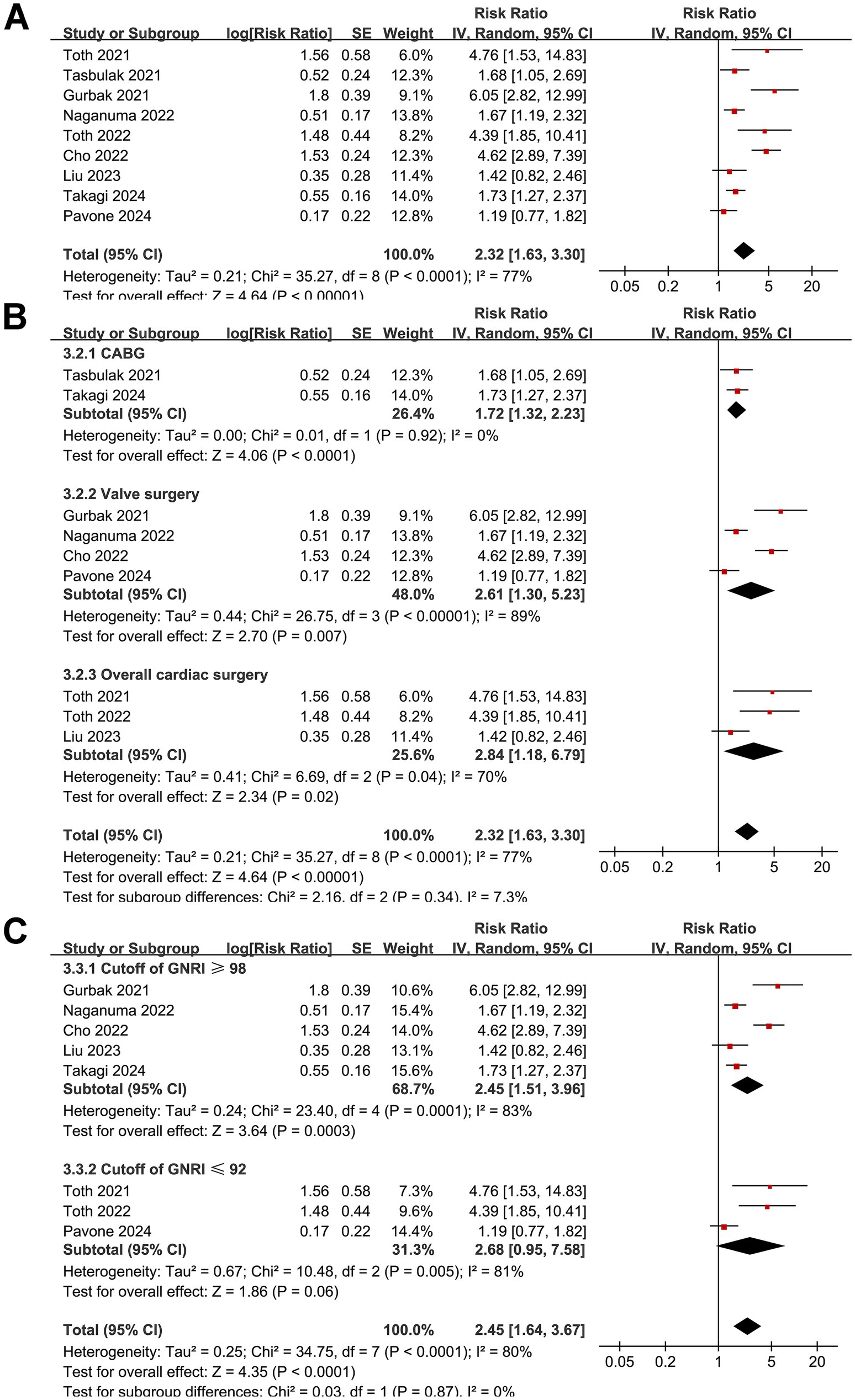
Figure 5. Forest plots for the meta-analysis of the association between a low GNRI and the risk of long-term mortality in patients after cardiac surgery. (A) Overall meta-analysis; (B) subgroup analysis according to the surgery type; (C) subgroup analysis according to the cutoffs of GNRI. GNRI, Geriatric Nutritional Risk Index.
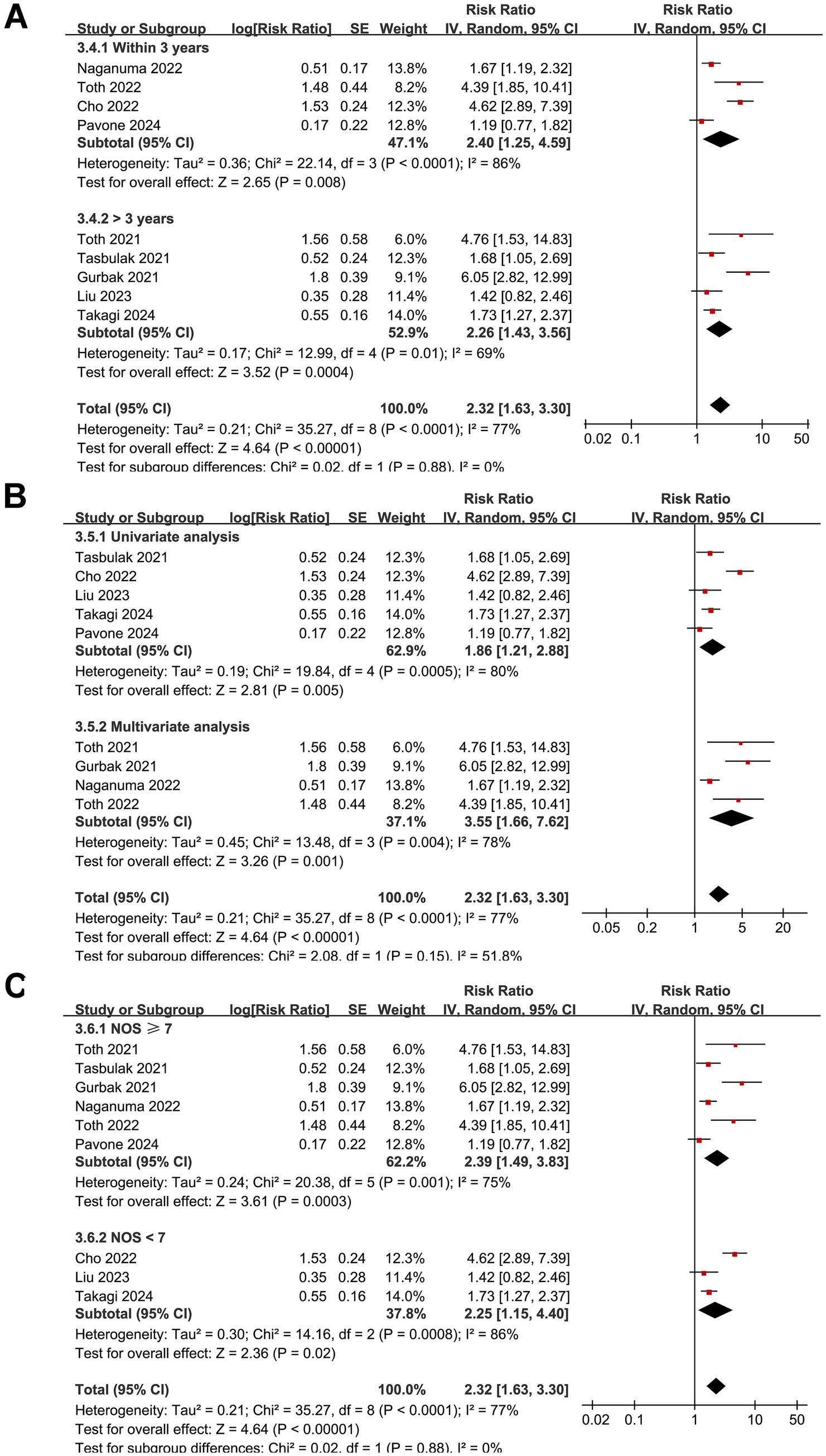
Figure 6. Forest plots for the subgroup analyses of the association between a low GNRI and the risk of long-term mortality in patients after cardiac surgery. (A) Subgroup analysis according to the follow-up durations; (B) subgroup analysis according to the analytic models; (C) subgroup analysis according to the NOS scores.
Publication bias
Figures 7A,B display funnel plots evaluating the association between a low preoperative GNRI and the risk of short- and long-term mortality. These findings were further supported by Egger’s regression analyses, which did not suggest a significant publication bias for the outcomes of short-term (p = 0.39) and long-term (p = 0.22) mortality. Publication biases for postoperative AKI, wound complications, and overall infection could not be determined due to the limited sample sizes as only four to seven studies were available for these outcomes.
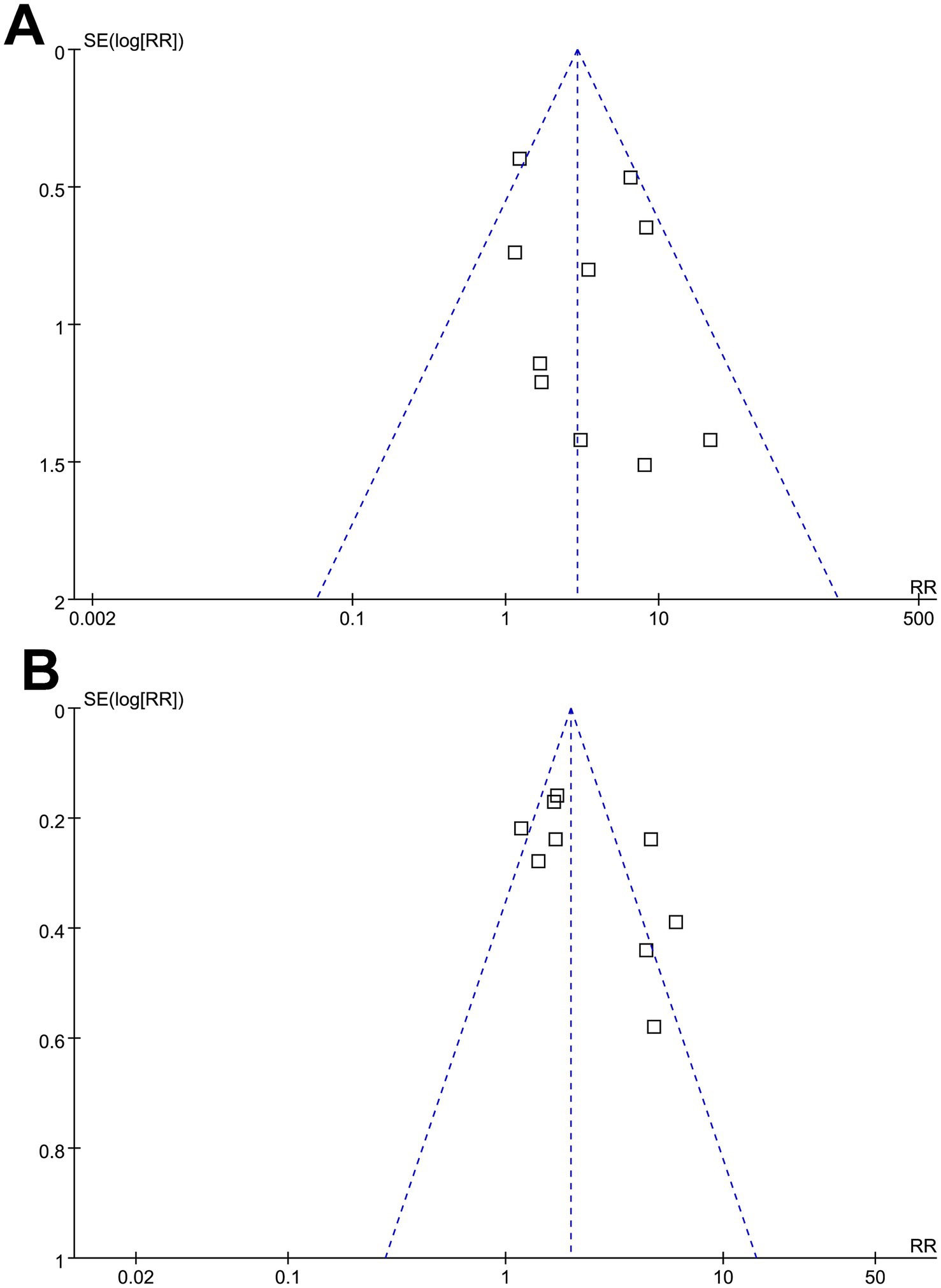
Figure 7. Funnel plots for estimating the potential publication biases underlying the meta-analyses of the associations between the GNRI and short-term and long-term mortality after cardiac surgery. (A) Funnel plots for the meta-analysis of the association between the GNRI and short-term mortality after cardiac surgery; (B) funnel plots for the meta-analysis of the association between the GNRI and long-term mortality after cardiac surgery. GNRI, Geriatric Nutritional Risk Index.
Discussion
This meta-analysis offers a comprehensive assessment of the relationship between preoperative GNRI and postoperative outcomes in cardiac surgery patients. The findings suggest that a low GNRI is significantly linked to increased short- and long-term mortality, as well as a higher risk of AKI and postoperative infections. However, no significant association was found with wound complications. These results highlight the potential prognostic value of preoperative nutritional status in this patient population.
The association between a low GNRI and increased mortality risk may be explained by several pathophysiological mechanisms. Malnutrition is known to contribute to systemic inflammation, immune dysfunction, delayed wound healing, and a higher susceptibility to infections, all of which can worsen surgical outcomes (38, 39). GNRI is derived from serum albumin levels and body weight, both of which are critical indicators of nutritional and metabolic status. Albumin is a key determinant of oncotic pressure and plays a vital role in transporting essential nutrients and hormones (40). Hypoalbuminemia is associated with chronic inflammation, increased vascular permeability, and impaired recovery from surgical stress (41). Additionally, body weight reflects overall nutritional reserves, and a lower body weight is linked to muscle wasting (42), frailty (43), and reduced physiological reserves (44), which can impair a patient’s ability to recover from the metabolic demands of surgery. Together, these components highlight the role of nutritional status in influencing postoperative survival.
It was noted that one study (25) contributed an extremely wide confidence interval, raising concerns about potential outlier influence in the meta-analysis of the outcome of short-term mortality after cardiac surgery. However, exclusion of this study in a sensitivity analysis did not substantially alter the pooled result for short-term mortality (RR: 2.91, 95% CI: 1.54–4.59, p = 0.001; I2 = 37%), confirming the robustness of the association. Additionally, this study did not appear as an outlier in the funnel plot (Figure 7A), suggesting its influence on the pooled effect size was limited despite the imprecision in its estimate. Besides the sensitivity analyses, subgroup analyses can also offer additional insights into the robustness of the findings. It was found that the association between the GNRI and mortality persisted across different types of cardiac surgeries, including CABG and valvular procedures, suggesting that the prognostic value of the GNRI is not limited to a specific surgical subgroup. While these procedures differ in surgical complexity, duration of cardiopulmonary bypass, and baseline patient characteristics—factors that may influence perioperative metabolic demand and nutritional vulnerability—the consistent association across surgery types highlights the generalizable role of the GNRI as a prognostic marker. This reinforces the relevance of preoperative nutritional assessment regardless of the specific cardiac procedure performed. Moreover, variations in GNRI cutoff values and follow-up durations did not significantly modify the observed associations, reinforcing the consistency of the findings. Differences in study quality, as assessed using the NOS, also did not substantially affect the results, further supporting the reliability of the meta-analysis. However, these results should be interpreted with caution because they were based on study-level data from a limited number of studies, and these results should be validated in large-scale prospective studies.
To further explain the observed heterogeneity, univariate meta-regression analyses were conducted. For long-term mortality, mean age emerged as a significant contributor to heterogeneity. This inverse association suggests that the prognostic impact of a low GNRI may be more pronounced in relatively younger cardiac surgery patients compared to their older counterparts. One possible explanation for this is that in younger patients, malnutrition may reflect a more severe underlying physiological or disease burden, such as cancer cachexia, chronic inflammation, or unrecognized sarcopenia, which would significantly amplify the surgical risks (45). In contrast, older patients often have a chronically low GNRI due to age-related sarcopenia and hypoalbuminemia, which may exert a more modest incremental risk relative to their already elevated baseline mortality (45). Additionally, for short-term mortality, sample size appeared to explain a moderate proportion of the heterogeneity (adjusted R2 = 23.5%, p = 0.095), although this was not statistically significant. This may reflect small-study effects, whereby studies with smaller samples are more susceptible to selection bias, an overestimation of effects, or publication bias. Smaller studies may also be more homogeneous in terms of patient characteristics, institutional practices, or perioperative protocols, leading to more pronounced or variable effect sizes. In contrast, larger studies may average out these differences, leading to more conservative estimates. These findings underscore the complexity of interpreting effect sizes across diverse populations and emphasize the importance of considering both biological and methodological heterogeneity in the synthesis of all available evidence. Taken together, the meta-regression findings suggest that demographic factors (such as age) and study design characteristics (such as sample size) may shape the observed relationship between the GNRI and prognosis of patients after cardiac surgery, further highlighting the need for individualized risk stratification and standardized methodological approaches in future research.
A key finding of this meta-analysis is the differential association of a low GNRI with various postoperative complications. While a significant association was observed with AKI and postoperative infections, the relationship with wound complications was not statistically significant. However, this result should be interpreted cautiously, as it was based on only four studies, and the analysis may have lacked adequate statistical power to detect a true effect. Therefore, the absence of a significant association may reflect insufficient evidence rather than a definitive lack of a relationship. Further studies with larger sample sizes and standardized definitions of wound complications are needed to clarify this potential link. The increased risk of AKI in patients with a low GNRI may be attributable to impaired renal perfusion, systemic inflammation, and oxidative stress, which are common in malnourished individuals (46). Additionally, low albumin levels can compromise endothelial function and lead to microvascular dysfunction, increasing the likelihood of renal injury following cardiac surgery (47). The higher risk of infections in patients with a low GNRI may be linked to impaired immune function, as malnutrition is associated with reduced levels of immunoglobulins and a diminished acute-phase response, making patients more susceptible to infections (48). The lack of a significant association with wound complications may be due to the limited number of studies reporting this outcome, resulting in insufficient statistical power. Future research with larger datasets is needed to clarify this relationship.
The key strengths of this meta-analysis include that it involved a thorough literature search; a large, pooled sample size; and an evaluation of multiple postoperative outcomes, offering a comprehensive assessment of GNRI’s prognostic value in cardiac surgery. The inclusion of both short- and long-term mortality enhances its clinical relevance, while the sensitivity and subgroup analyses reinforce the robustness of the results. Consistency across analytical models and patient subgroups further supports the validity of the conclusions. Despite these advantages, the study has certain limitations that should be noted. Most of the included studies were retrospective in design, making them susceptible to recall bias, selection bias, and residual confounding (49). Therefore, the results of the meta-analysis should be validated in large-scale prospective cohort studies. Furthermore, although most studies adjusted for key clinical variables, the possibility of unmeasured confounders influencing the associations cannot be ruled out. For example, there was variability in the timing of GNRI assessment among the included studies—ranging from at admission to the immediate preoperative period—which may have introduced a confounding effect. Since no standardized timing for GNRI evaluation has yet been established in the cardiac surgical setting, it remains uncertain whether an earlier or later assessment may better reflect perioperative nutritional risk. Despite this variability, the consistent associations observed in our analyses support the robustness of the GNRI, although future studies should clarify the optimal assessment window. Additionally, given that this meta-analysis was based on study-level data rather than individual patient data, we were unable to account for patient-specific factors, such as frailty, preoperative functional status, or the impact of perioperative interventions on outcomes. Another important limitation is the potential for publication bias, as studies with negative results may be less likely to be published. While funnel plots and Egger’s regression test did not indicate significant publication bias for the mortality outcomes, the small number of studies available for some complications limited our ability to formally assess bias in those analyses. Lastly, this meta-analysis was observational in nature and, therefore, could not establish causality between the GNRI and postoperative outcomes.
The findings of this study have important clinical implications. The significant association between the GNRI and adverse postoperative outcomes highlights the potential value of routine preoperative nutritional assessment in patients undergoing cardiac surgery. While the GNRI should not yet be considered a treatment target, its use in risk stratification may help identify high-risk patients who could benefit from enhanced perioperative nutritional support and closer postoperative monitoring. Future research should focus on prospective cohort studies and randomized controlled trials (RCTs) to further evaluate the role of nutritional interventions, particularly those targeting the GNRI, in improving surgical outcomes. Interestingly, studies have shown that preoperative nutritional optimization—including energy–protein supplementation and immunonutrition—can reduce postoperative complications and improve recovery in malnourished surgical patients, including those undergoing cardiac surgery (50, 51). A previous systematic review and meta-analysis of RCTs found that preoperative carbohydrate loading reduced postoperative insulin resistance, ICU stay, and the need for inotropic support in cardiac surgery patients (50). Moreover, expert guidelines also recommend incorporating nutritional support strategies into the care of cardiac surgical patients to improve outcomes (52). While these interventions were not specifically guided by `GNRI, they provide a compelling rationale for exploring whether GNRI-based nutritional interventions can further optimize surgical recovery. Future prospective and interventional studies are needed to evaluate the effectiveness of such strategies. Additionally, studies incorporating individual patient data could provide more granular insights into how specific patient characteristics influence the association between the GNRI and outcomes.
Conclusion
In conclusion, this meta-analysis demonstrates that a low preoperative GNRI is significantly associated with an increased risk of short-term and long-term mortality, as well as major postoperative complications, such as AKI and infections, in patients undergoing cardiac surgery. Although prospective studies are needed to validate the results, these findings of the meta-analysis support the potential utility of the GNRI as a prognostic tool for surgical risk stratification. Further research is needed to refine the clinical application of the GNRI and explore strategies for optimizing perioperative nutritional management in this patient population.
Data availability statement
The original contributions presented in the study are included in the article/supplementary material, further inquiries can be directed to the corresponding author.
Author contributions
PL: Software, Writing – original draft, Formal analysis, Conceptualization, Methodology, Investigation. KS: Data curation, Formal analysis, Software, Writing – review & editing, Investigation, Methodology. YL: Writing – review & editing, Software, Formal analysis, Methodology, Data curation. H-BR: Supervision, Validation, Project administration, Formal analysis, Methodology, Software, Conceptualization, Writing – review & editing.
Funding
The author(s) declare that no financial support was received for the research and/or publication of this article.
Acknowledgments
We thank Medjaden Inc. for scientific editing of this manuscript.
Conflict of interest
The authors declare that the research was conducted in the absence of any commercial or financial relationships that could be construed as a potential conflict of interest.
Generative AI statement
The authors declare that no Gen AI was used in the creation of this manuscript.
Publisher’s note
All claims expressed in this article are solely those of the authors and do not necessarily represent those of their affiliated organizations, or those of the publisher, the editors and the reviewers. Any product that may be evaluated in this article, or claim that may be made by its manufacturer, is not guaranteed or endorsed by the publisher.
Abbreviations
AKI, acute kidney injury; GNRI, Geriatric Nutritional Risk Index; CABG, coronary artery bypass grafting; NOS, Newcastle–Ottawa Scale; RR, risk ratio; CI, confidence interval.
References
1. Qu, C, Liao, S, Zhang, J, Cao, H, Zhang, H, Zhang, N, et al. Burden of cardiovascular disease among elderly: based on the global burden of disease study 2019. Eur Heart J Qual Care Clin Outcomes. (2024) 10:143–53. doi: 10.1093/ehjqcco/qcad033
2. Vervoort, D, Meuris, B, Meyns, B, and Verbrugghe, P. Global cardiac surgery: access to cardiac surgical care around the world. J Thorac Cardiovasc Surg. (2020) 159:987–996.e6. doi: 10.1016/j.jtcvs.2019.04.039
3. Shaw, AD, Guinn, NR, Brown, JK, Arora, RC, Lobdell, KW, Grant, MC, et al. Controversies in enhanced recovery after cardiac surgery. Perioper Med (Lond). (2022) 11:19. doi: 10.1186/s13741-022-00250-7
4. Cheruku, SR, Raphael, J, Neyra, JA, and Fox, AA. Acute kidney injury after cardiac surgery: prediction, prevention, and management. Anesthesiology. (2023) 139:880–98. doi: 10.1097/aln.0000000000004734
5. Rhee, C, and Sax, PE. Evaluation of fever and infections in cardiac surgery patients. Semin Cardiothorac Vasc Anesth. (2015) 19:143–53. doi: 10.1177/1089253214538524
6. Stephens, RS, and Whitman, GJ. Postoperative critical care of the adult cardiac surgical patient. Part I: routine postoperative care. Crit Care Med. (2015) 43:1477–97. doi: 10.1097/ccm.0000000000001059
7. N, J, Nas, AA, Sm, M, Na, AY, S, A, S, K, et al. Nutritional status and post-cardiac surgery outcomes: an updated review with emphasis on cognitive function. J Clin Med. (2024) 13:4015. doi: 10.3390/jcm13144015
8. Norman, K, Haß, U, and Pirlich, M. Malnutrition in older adults—recent advances and remaining challenges. Nutrients. (2021) 13:2764. doi: 10.3390/nu13082764
9. Bourke, CD, Berkley, JA, and Prendergast, AJ. Immune dysfunction as a cause and consequence of malnutrition. Trends Immunol. (2016) 37:386–98. doi: 10.1016/j.it.2016.04.003
10. Dent, E, Wright, ORL, Woo, J, and Hoogendijk, EO. Malnutrition in older adults. Lancet. (2023) 401:951–66. doi: 10.1016/S0140-6736(22)02612-5
11. Hao, X, Li, D, and Zhang, N. Geriatric nutritional risk index as a predictor for mortality: a meta-analysis of observational studies. Nutr Res. (2019) 71:8–20. doi: 10.1016/j.nutres.2019.07.005
12. Cereda, E, and Pedrolli, C. The geriatric nutritional risk index. Curr Opin Clin Nutr Metab Care. (2009) 12:1–7. doi: 10.1097/MCO.0b013e3283186f59
13. Kregel, HR, Murphy, PB, Attia, M, Meyer, DE, Morris, RS, Onyema, EC, et al. The geriatric nutritional risk index as a predictor of complications in geriatric trauma patients. J Trauma Acute Care Surg. (2022) 93:195–9. doi: 10.1097/ta.0000000000003588
14. Abd-El-Gawad, WM, Abou-Hashem, RM, El Maraghy, MO, and Amin, GE. The validity of geriatric nutrition risk index: simple tool for prediction of nutritional-related complication of hospitalized elderly patients. Comparison with Mini nutritional assessment. Clin Nutr. (2014) 33:1108–16. doi: 10.1016/j.clnu.2013.12.005
15. Dent, E, Hoogendijk, EO, Visvanathan, R, and Wright, ORL. Malnutrition screening and assessment in hospitalised older people: a review. J Nutr Health Aging. (2019) 23:431–41. doi: 10.1007/s12603-019-1176-z
16. Unosawa, S, Taoka, M, Osaka, S, Yuji, D, Kitazumi, Y, Suzuki, K, et al. Is malnutrition associated with postoperative complications after cardiac surgery? J Card Surg. (2019) 34:908–12. doi: 10.1111/jocs.14155
17. Gürbak, I, Güner, A, Güler, A, Sahin, AA, Çelik, Ö, Uzun, F, et al. Prognostic influence of objective nutritional indexes on mortality after surgical aortic valve replacement in elderly patients with severe aortic stenosis (from the nutrition-SAVR trial). J Card Surg. (2021) 36:1872–81. doi: 10.1111/jocs.15434
18. Tasbulak, O, Guler, A, Duran, M, Sahin, A, Bulut, U, Avci, Y, et al. Association between nutritional indices and long-term outcomes in patients undergoing isolated coronary artery bypass grafting. Cureus. (2021) 13:e16567. doi: 10.7759/cureus.16567
19. Tóth, K, Szabó, A, Nagy, A, Szabó, D, Szécsi, B, Eke, C, et al. Preoperative nutritional state is associated with mid- and long-term mortality after cardiac surgery. Ann Palliat Med. (2021) 10:11333–47. doi: 10.21037/apm-21-1015
20. Aykut, A, and Salman, N. Poor nutritional status and frailty associated with acute kidney injury after cardiac surgery: a retrospective observationalб═study. J Card Surg. (2022) 37:4755–61. doi: 10.1111/jocs.17134
21. Cho, JS, Shim, JK, Kim, KS, Lee, S, and Kwak, YL. Impact of preoperative nutritional scores on 1-year postoperative mortality in patients undergoing valvular heart surgery. J Thorac Cardiovasc Surg. (2022) 164:1140–1149.e3. doi: 10.1016/j.jtcvs.2020.12.099
22. Naganuma, M, Kudo, Y, Suzuki, N, Masuda, S, and Nagaya, K. Effect of malnutrition and frailty status on surgical aortic valve replacement. Gen Thorac Cardiovasc Surg. (2022) 70:24–32. doi: 10.1007/s11748-021-01667-5
23. Tóth, K, Szabó, A, Menyhárd, J, Benke, K, Radovits, T, Pólos, M, et al. Poor preoperative nutritional status, but not hormone levels, are associated with mortality after cardiac surgery. J Cardiothorac Vasc Anesth. (2022) 36:3074–83. doi: 10.1053/j.jvca.2022.04.035
24. Usta, S, and Engin, M. Investigation of the effects of preoperative nutritional status scores on renal injury after cardiac surgery in elderly patients. Eur Rev Med Pharmacol Sci. (2022) 26:9345–52. doi: 10.26355/eurrev_202212_30685
25. Çoban, Ö, and Uçak, HA. Predictive power of the geriatric nutritional risk index for mortality in patients over 80 years of age undergoing open heart surgery. Cukurova Med J. (2023) 48:1374–9. doi: 10.17826/cumj.1354167
26. Liu, Z, Zang, W, Zhang, P, and Shen, Z. Prognostic implications of global leadership initiative on malnutritionБ─ſdefined malnutrition in older patients who underwent cardiac surgery in China. Surgery. (2023) 173:472–8. doi: 10.1016/j.surg.2022.11.008
27. Wu, LY, Yan, QQ, Mai, HH, Song, JK, Ye, LF, Che, XR, et al. Does the geriatric nutritional risk index play a predictive role in postoperative atrial fibrillation and outcomes in cardiac surgery? J Cardiothorac Vasc Anesth. (2023) 37:58–64. doi: 10.1053/j.jvca.2022.09.097
28. Bao, P, Qiu, P, Li, T, Lv, X, Wu, J, Wu, S, et al. Prognostic value of preoperative nutritional status for postoperative moderate to severe acute kidney injury among older patients undergoing coronary artery bypass graft surgery: a retrospective study based on the MIMIC-IV database. Ren Fail. (2024) 46:2429683. doi: 10.1080/0886022x.2024.2429683
29. Pavone, N, Cammertoni, F, Bruno, P, Cutrone, G, Chiariello, GA, Calabrese, M, et al. Does a poor preoperative nutritional status impact outcomes of heart valve surgery? J Frailty Aging. (2024) 13:501–6. doi: 10.14283/jfa.2024.54
30. Takagi, S, Ogihara, Y, Yanagisawa, J, Goto, Y, and Okawa, Y. Preoperative malnutrition calculated using the geriatric nutritional risk index in off-pump coronary artery bypass grafting. Heart Surg Forum. (2024) 27:E891–7. doi: 10.59958/hsf.7527
31. Zhao, A, Wu, L, Lin, L, Li, S, Liao, X, Chen, L, et al. The geriatric nutritional risk index is related to adverse hospitalization outcomes in individuals undergoing cardiac surgery. Sci Rep. (2024) 14:19126. doi: 10.1038/s41598-024-69668-x
32. Page, MJ, McKenzie, JE, Bossuyt, PM, Boutron, I, Hoffmann, TC, Mulrow, CD, et al. The PRISMA 2020 statement: an updated guideline for reporting systematic reviews. BMJ. (2021) 372:n71. doi: 10.1136/bmj.n71
33. Page, MJ, Moher, D, Bossuyt, PM, Boutron, I, Hoffmann, TC, Mulrow, CD, et al. PRISMA 2020 explanation and elaboration: updated guidance and exemplars for reporting systematic reviews. BMJ. (2021) 372:n160. doi: 10.1136/bmj.n160
34. Higgins, J, Thomas, J, Chandler, J, Cumpston, M, Li, T, and Page, M Cochrane handbook for systematic reviews of interventions version 6.2. The Cochrane Collaboration. (2021). Available online at: https://www.training.cochrane.org/handbook (Accessed January 29, 2025).
35. Wells, GA, Shea, B, O'Connell, D, Peterson, J, Welch, V, and Losos, M. The Newcastle-Ottawa scale (NOS) for assessing the quality of nonrandomised studies in meta-analyses. (2010). Available online at: http://www.ohri.ca/programs/clinical_epidemiology/oxford.asp (Accessed January 29, 2025).
36. Higgins, JP, and Thompson, SG. Quantifying heterogeneity in a meta-analysis. Stat Med. (2002) 21:1539–58. doi: 10.1002/sim.1186
37. Egger, M, Davey Smith, G, Schneider, M, and Minder, C. Bias in meta-analysis detected by a simple, graphical test. BMJ. (1997) 315:629–34. doi: 10.1136/bmj.315.7109.629
38. Morales, F, Montserrat-de la Paz, S, Leon, MJ, and Rivero-Pino, F. Effects of malnutrition on the immune system and infection and the role of nutritional strategies regarding improvements in children's health status: a literature review. Nutrients. (2023) 16:1. doi: 10.3390/nu16010001
39. Seth, I, Lim, B, Cevik, J, Gracias, D, Chua, M, Kenney, PS, et al. Impact of nutrition on skin wound healing and aesthetic outcomes: a comprehensive narrative review. JPRAS Open. (2024) 39:291–302. doi: 10.1016/j.jpra.2024.01.006
40. Bihari, S, Bannard-Smith, J, and Bellomo, R. Albumin as a drug: its biological effects beyond volume expansion. Crit Care Resusc. (2020) 22:257–65. doi: 10.1016/S1441-2772(23)00394-0
41. Soeters, PB, Wolfe, RR, and Shenkin, A. Hypoalbuminemia: pathogenesis and clinical significance. JPEN J Parenter Enteral Nutr. (2019) 43:181–93. doi: 10.1002/jpen.1451
42. Xie, R-Z, Li, X-S, Zha, F-D, Li, G-Q, Zhao, W-Q, Liang, Y-F, et al. Relationship between body mass index and low skeletal muscle mass in adults based on NHANES 2011–2018. Sci Rep. (2025) 15:2596. doi: 10.1038/s41598-025-87176-4
43. Bowen, ME. The relationship between body weight, frailty, and the disablement process. J Gerontol B Psychol Sci Soc Sci. (2012) 67:618–26. doi: 10.1093/geronb/gbs067
44. Bales, CW, and Ritchie, CS. Sarcopenia, weight loss, and nutritional frailty in the elderly. Annu Rev Nutr. (2002) 22:309–23. doi: 10.1146/annurev.nutr.22.010402.102715
45. Meza-Valderrama, D, Marco, E, Dávalos-Yerovi, V, Muns, MD, Tejero-Sánchez, M, Duarte, E, et al. Sarcopenia, malnutrition, and cachexia: adapting definitions and terminology of nutritional disorders in older people with cancer. Nutrients. (2021) 13:761. doi: 10.3390/nu13030761
46. Gao, T, and Yu, X. Association between nutritional status scores and the 30-day mortality in patients with acute kidney injury: an analysis of MIMIC-III database. BMC Nephrol. (2023) 24:296. doi: 10.1186/s12882-023-03329-5
47. Abrard, S, Streichenberger, A, Riou, J, Hersant, J, Rineau, E, Jacquet-Lagrèze, M, et al. Preoperative endothelial dysfunction for the prediction of acute kidney injury after cardiac surgery using cardiopulmonary bypass: a pilot study based on a second analysis of the MONS study. Perioper Med (Lond). (2024) 13:12. doi: 10.1186/s13741-024-00364-0
48. Rodríguez, L, Cervantes, E, and Ortiz, R. Malnutrition and gastrointestinal and respiratory infections in children: a public health problem. Int J Environ Res Public Health. (2011) 8:1174–205. doi: 10.3390/ijerph8041174
49. Talari, K, and Goyal, M. Retrospective studies - utility and caveats. J R Coll Physicians Edinb. (2020) 50:398–402. doi: 10.4997/jrcpe.2020.409
50. Kotfis, K, Jamioł-Milc, D, Skonieczna-Żydecka, K, Folwarski, M, and Stachowska, E. The effect of preoperative carbohydrate loading on clinical and biochemical outcomes after cardiac surgery: a systematic review and meta-analysis of randomized trials. Nutrients. (2020) 12:3105. doi: 10.3390/nu12103105
51. Sebestyén, AR, Turan, C, Szemere, A, Virág, M, Ocskay, K, Dembrovszky, F, et al. Preoperative carbohydrate loading reduces length of stay after major elective, non-cardiac surgery when compared to fasting: a systematic review and meta-analysis. Sci Rep. (2025) 15:19119. doi: 10.1038/s41598-025-00767-z
52. Stoppe, C, Goetzenich, A, Whitman, G, Ohkuma, R, Brown, T, Hatzakorzian, R, et al. Role of nutrition support in adult cardiac surgery: a consensus statement from an international multidisciplinary expert group on nutrition in cardiac surgery. Crit Care. (2017) 21:131. doi: 10.1186/s13054-017-1690-5
Keywords: cardiac surgery, Geriatric Nutritional Risk Index, meta-analysis, mortality, postoperative complications
Citation: Luo P, Shi K, Luo Y and Ren H-B (2025) Prognostic value of the Geriatric Nutritional Risk Index in patients undergoing cardiac surgery: a systematic review and meta-analysis. Front. Nutr. 12:1628671. doi: 10.3389/fnut.2025.1628671
Edited by:
Enyi Shi, China Medical University, ChinaReviewed by:
Siyou Tan, The First Affiliated Hospital of Guangxi Medical University, ChinaYi-Zhen Gong, The First Affiliated Hospital of Guangxi Medical University, China
Copyright © 2025 Luo, Shi, Luo and Ren. This is an open-access article distributed under the terms of the Creative Commons Attribution License (CC BY). The use, distribution or reproduction in other forums is permitted, provided the original author(s) and the copyright owner(s) are credited and that the original publication in this journal is cited, in accordance with accepted academic practice. No use, distribution or reproduction is permitted which does not comply with these terms.
*Correspondence: Hai-Bo Ren, cmVuaGFpYm8xMjdAMTYzLmNvbQ==
 Ping Luo
Ping Luo Kai Shi
Kai Shi Yu Luo
Yu Luo Hai-Bo Ren
Hai-Bo Ren